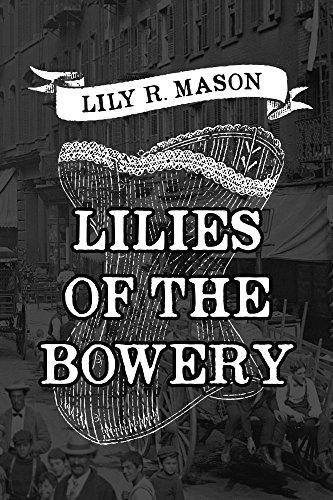In this quaint af novel about the Italian Lower East Side in the early twentieth century, 18-year-old Joan, her mother, and her younger brother sail steerage from Napoli when called by their head of household. When the family lands at Ellis Island, Papa Passerini is nowhere to be found, so they have to make their own way. Joan's very pregnant mother gets a factory job, and her brother becomes a stevedore. Joan, who has a disaiblity has a harder time finding work because, though her fingers are nimble, her awkward legs are seen as bad luck.
That is, until Joan's eyes meet Paloma's across the laundry. Paloma, a young woman herself, is running the laundry with no visible help. She hires Joan to do mending and eventually helps her get a commission to sew a fine wedding dress.
The book is self- or micropublished and could have used some professional editing, but it's still a sweet, if quaint story of two young women falling in love, though they don't even know that's what they're doing at first.
It's like a tame porno with passages like
I painted slowly, taking care that each corner and crevice received ample stroking of my brush.
and a shared lunch of pickles and "fresh bread with honey dripped into it." Or am I reading into it? Joan is initially wary of the pickles, and I hear from my friend Lisa that to this day Italians think pickling is a terrible thing to do to a vegetable. Anyway, Joan develops a taste for pickles, but honey is a real treat for her. Next comes frothy milk that makes Joan's mouth water. Mamma mia!
And don't get me started on the water fight that ends with both women soaking wet and in need of a change of clothes... Once they're in Paloma's bedroom waiting for their dresses to dry, Paloma suggests lying down for a nap.
"I can't take a long nap. Perhaps just lay down and rest."
"Rest does the body good," I said, thinking of how often Mamma prescribed rest for maladies of the body or heart.
Paloma nodded, still looking uncertain. Then she looked up at me with timid, hopeful eyes. "Will you rest with me?"
Her plea was so full of yearning, I would never have considered denying her.
See what I mean by "quaint"? Or maybe it's super tongue and cheek?
Strange thing: I read a library copy of the book, which seems not to have been checked out before I borrowed it. Yet there are mysterious stains, and also these flower stickers.

#corset #chemise
There are things I could nitpick, but I won't. I will say that I like how Joan's disability is an important part of who she is and how she navigates the world, but it isn't a hinge point of the plot. Both women are heavily Catholic, and I like how Joan equates physical pleasure to being close to God. But once she figures out that Catholicism isn't so down with Boston marraige, she reconsiders her feelings for Paloma, which brings up the issue of Joan being Paloma's employee, and thus not in an equal relationship. This inequity bothers Joan, but not in the way it will bother an early 21st century reader.
The ending may surprise and disappoint you, but I sort of like that, that Joan still lives in the world of the day, not one where women can live wholly independent lives.
I wish I'd read Lily of the Valley, so I could know if there are connection. Or is it after Lillies of the Field?
